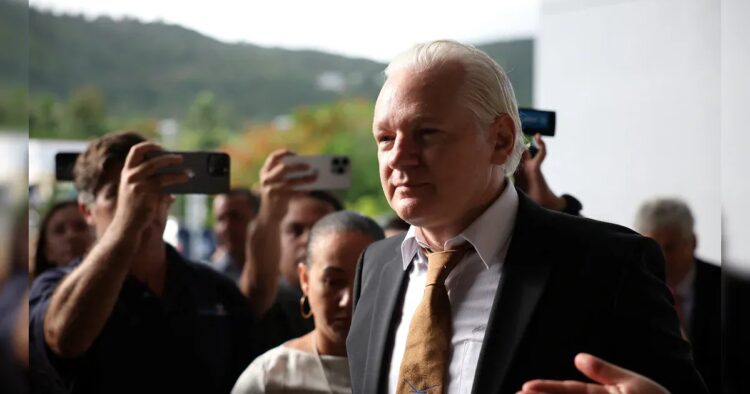Julian Assange, the founder of WikiLeaks, was freed by a court on the U.S. Pacific island territory of Saipan on Wednesday. Assange pleaded guilty to violating U.S. espionage law in a deal that will allow him to return to Australia.
During a three-hour court hearing, Assange admitted to one criminal count of conspiring to obtain and disclose classified U.S. national defense documents. He argued that he believed his actions were protected by the First Amendment, which guarantees free speech.
“Working as a journalist I encouraged my source to provide information that was said to be classified to publish that information,” Assange told the court. “I believed the First Amendment protected that activity but accept that it was … a violation of the espionage statute.”
Chief U.S. District Judge Ramona V. Manglona accepted Assange’s guilty plea and released him due to the time he had already served in a British jail.
Assange, 52, is scheduled to leave Saipan on a private jet shortly after noon local time (0200 GMT). He will be accompanied by Australia’s ambassadors to the U.S. and UK. They will then travel to Canberra, Australia, with an expected arrival just before 7 p.m. (0900 GMT).
Court filings revealed that Assange had agreed to plead guilty to a single criminal count. The U.S. District Court for the Northern Mariana Islands was chosen for the case because Assange did not want to travel to the mainland U.S. and due to the territory’s proximity to Australia, according to prosecutors.
The hearing attracted significant media attention, with dozens of journalists worldwide attending. Media were not allowed to film the proceedings inside the courtroom.
Stella Assange, Julian’s wife, commented on social media platform X about the overwhelming experience he must have had walking through the press after years of isolation in a high-security British prison. “I watch this and think how overloaded his senses must be, walking through the press scrum after years of sensory deprivation and the four walls of his high-security Belmarsh prison cell,” she said.
Julian Assange, who was born in Australia, spent more than five years in a high-security jail in Britain and seven years in the Ecuadorean embassy in London. He was avoiding extradition to the U.S., where he faced 18 criminal charges and accusations of sex crimes in Sweden.
ALSO READ: “Julian Assange Walks Free: WikiLeaks Founder Leaves UK Jail Following US Plea Deal”
Assange’s supporters argue that he is a victim who exposed U.S. wrongdoing and potential crimes, particularly in the conflicts in Afghanistan and Iraq. However, U.S. officials claim that the release of secret documents endangered lives.
The Australian government has been advocating for Assange’s release and has discussed the matter with U.S. officials several times. Prime Minister Anthony Albanese emphasized the long and careful process that led to Assange’s release.0 “This isn’t something that has happened in the last 24 hours,” Albanese said at a news conference on Wednesday. “This is something that has been considered, patient, worked through in a calibrated way, which is how Australia conducts ourselves.”

















Comments